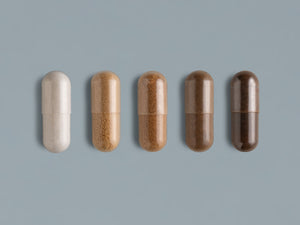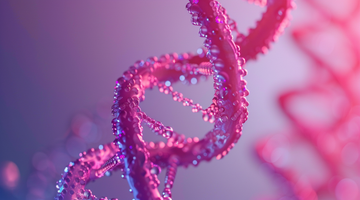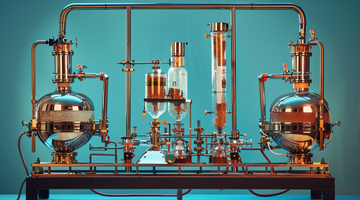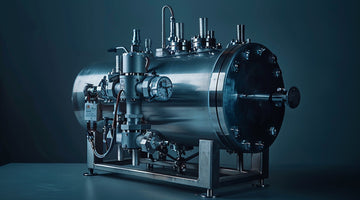
What is epigenetic age vs. chronological age?
Have you ever wondered why people age so differently? Some people in their 80s remain mentally sharp, while others struggle with memory.
The answer lies in a concept called epigenetic age. Unlike chronological age - which is important for celebrating birthdays - epigenetic age tells a story of how slowly or rapidly your internal body is aging. Luckily, there are measurable indicators of epigenetic age.

Maximizing Your Healthy Lifespan
The choices you make every day—what you eat, how you move, and how well you sleep—are crucial in determining how you age. Our supplements enhance these healthy habits, supporting your body and mind, and ultimately helping you live a longer, healthier life.
1. Altered Intercellular Communication
As we age, our cells become less effective at talking to each other. This manifests in many ways, including a less capable immune system as well as disruptions in hormone levels and systemic blood factors.
2. Celular senescene
Cells enter a state of senescence after dividing too many times or in response to things like DNA damage, oxidative stress, and mutations. Although senescent cells are no longer able to divide, they accumulate with age and secrete proinflammatory molecules that wreak havoc on their environment.
3. Chronic Inflamation
Alongside the accumulation of senescent cells and infectious pathogens over time, inflammation increases with age. This phenomenon is referred to as "inflammaging."
4. Deregulated Nutrient-sensing
Across simple and complex animals, pathways that sense and respond to nutrients are consistent regulators of lifespan. The effectiveness of these pathways wane with age and this contributes to the likelihood of developing type 2 diabetes and other metabolic disorders.
5. Disabled Macroautophagy
Autophagy, which declines with age, refers to a cellular recycling program that removes old and damaged cellular components, such as mitochondria and proteins.
6. Dysbiosis
The gut microbiome, which plays important roles in metabolite production, nutrient absorption, and immunity, undergoes major shifts with age. Key changes include a loss of ecological diversity and a decrease in the number of beneficial microbes.
7. Epigenetic Alterations
Epigenetic changes are modifiable and can influence gene expression. Over time, the epigenome becomes dysregulated and this results in genes being turned on that should be off and vice versa. DNA methylation, a type of epigenetic modification, tends to globally decrease with age.
8. Genomic Instability
Our cells are constantly making and repairing DNA. While the machinery that enables this is incredibly efficient, errors inevitably occur and mutations build up with age. Some of these mutations are harmful, such as those that give rise to cancer.
9. Loss of proteostasis
In our cells, proteins are the workers that accomplish necessary tasks. In order to work properly, however, new proteins must be correctly folded and old proteins must be efficiently disposed of. With age and in different neurological disorders like Alzheimer’s disease, proteins become misfolded and accumulate in harmful aggregates.
10. Mitochondrial dysfunction
Mitochondria are the reactors in our cells that produce energy required for life. These cellular machines have their own DNA, produce free radicals, and can induce cell death in response to damage. Over time, mitochondrial efficiency decreases.
11. Stem Cell Exhaustion
Stem cells have a unique ability to turn into many different kinds of cells. Because of this, they can replenish cells as they die off. However, the number of stem cells in our body declines with age and this leads to a reduction in regenerative capacity.
12. Telomere attrition
Telomeres are protective caps on the ends of our chromosomes that shorten every time a cell divides. When they get too short, cells become senescent and enter a zombie-like state.
Science
Microbiome Dysbiosis: A Hallmark of Aging and the Gateway to Longevity
Read more
What are longevity supplements, and do you need them?
Read more
The Synergy of Exercise, Cordyceps, and Lion’s Mane for Longevity
Read more
12 Hallmarks of Aging and How to Combat Them
Read more
How medicinal mushrooms can boost your microbiome
Read more
Meet NAD+, the key component of life, and witness our astonishing new data!
Read more
Sooo.me™ chief scientist - passionate about living forever
Read more
Understanding aging and strategies for prolonging life to 120 years
Read more
Trans-resveratrol - guardian of youth
Read more
NR (Nicotinamide Riboside) - a key component to fuel our cells
Read more
Chaga - our immunity's best friend
Read more
Reishi - a mushroom of dreams that eases anxiety and stress
Read more
Sooo.me™ pharma-grade longevity nutraceuticals founder: mission - 120tribe!
Read more
Revolutionizing nutrition: a glimpse into our innovative laboratory and bioreactor technology
Read more
Unveiling the art of crafting premium medicinal mushroom nutraceuticals
Read more
Why Sooo.me™ chooses eco-friendly biodegradable packaging
Read more

















